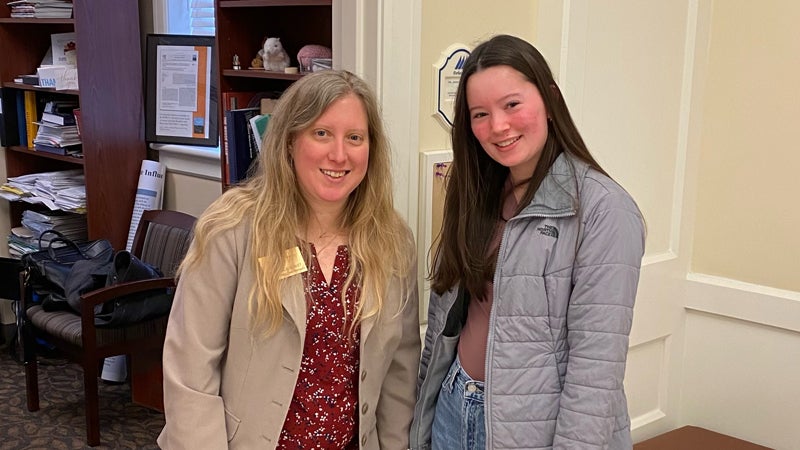Essay contest winner: ‘Miseducation’ plays role in post-Civil Rights Movement inequalities
Published 4:01 pm Friday, March 10, 2023
Smithfield High School student Lia Corning blames “miseducation” for racial inequalities that persist in the 21st century.
While the Civil Rights Movement of the 1950s and ’60s “made large strides” in overturning segregation laws, and allowing Black and brown Americans to see politicians, actors and even dolls who look like them, “equality is something we are still fighting for,” Corning writes in an essay that won first place in The Smithfield Times’ third annual Black History Month Essay Contest, open to high school students in Isle of Wight and Surry counties.
This year’s contest was co-sponsored by The Schoolhouse Museum, whose representatives judged 45 entries.
Public, private and homeschooled students were asked to write essays of up to 350 words answering the question, “How did the Civil Rights Movement change the world?”
Corning, an 18-year-old lifelong Carrollton resident, learned of the contest from her English teacher, Julie Eng, and was intrigued after having recently studied the Civil Rights Movement in-depth in her advanced-placement history course, which will allow her to receive college credit.
“There is still a lot of miseducation, just because some people aren’t willing to accept certain facts,” Corning told the Times in an interview. “They’re scared to feel guilty about their past.”
For example, she noted she and her classmates learned in elementary school how Christopher Columbus, the Italian explorer and namesake of the United States’ Columbus Day holiday, discovered the Americas in 1492. But it wasn’t until later that she learned that Columbus, upon setting foot on the present-day Bahamas, enslaved many of the natives, whom he called “Indians,” and began a culture of forced plantation labor and racism.
She’s been following recent discussions by Isle of Wight County School Board members about a policy change that would mandate teachers “not indoctrinate” students with “the belief that the United States, or any governmental entity within the nation, perpetuates systemic racism.”
“When the School Board decides to limit some of the equation because they’re afraid of how children are going to react, I think we’re missing the bigger picture here,” Corning said. “… Despite their intentions, when you take away proper education and you take away all the facts, thinking that you are helping students, you’re really not; you’re just shielding them from the real world.”
Corning has been accepted to the University of Virginia and to Virginia Tech, and is presently interviewing for scholarships. She plans to go into neuroscience, and possibly attend medical school. When not attending class, Corning is often volunteering at Riverside Regional Medical Center in Newport News, doing research at Christopher Newport University on the effects of space radiation on human behavior, or participating in her school’s National Honor Society and Beta Club. She also plays piano.
She is the daughter of Bryan and Keiko Corning. As the Essay Contest winner, Corning will receive $250, courtesy of The Schoolhouse Museum, the Times and an anonymous donor.
Smithfield High juniors Zachary Myers and Anthony Silvis won second and third place, respectively. Myers will receive $100 and Silvis will receive $50. All three essays are reproduced below.
Winning essay:
By Lia Corning
The Civil Rights Movement was powerful because it sent a message. A message to the world that it is impossible to achieve world peace if we suppress those intended by our creator to be our neighbors and friends. It is impossible to achieve world peace without equality, without the compassion and morality essential to our souls.
The Civil Rights Movement was powerful because it proved the importance of democracy. A message to the world that in order to enact change, all we need is a voice. To speak loudly, a voice full of passion and frustration — frustration with the way the world was moving. It demonstrated the impact of the people on policy and the justice system. Through protest and boycotting, the Movement was able to overturn past court cases and established equality, now written in our law.
Ultimately, the Civil Rights Movement changed the world because it allowed for representation. A message to the world that inclusion of various backgrounds will promote new ideas and innovation. We now have government officials, dolls, and actors that properly reflect our diverse American population. Seeing someone with the same background with the ability to achieve one’s dream position inspires the next generations, engendering the confidence needed to act and take on difficulties.
The Civil Rights Movement made large strides that moved our world in a positive direction, toward equality and harmony for all. Equality is something we are still fighting for, not only in the United States, but globally as well — yet due to the Civil Rights Movement, the voices of those previously oppressed are now shown the power of protest and the influence that they in turn have on changing the world.
Not all countries have the same governmental systems as the United States, yet the Movement demonstrated that without the voice of the people, beneficial change is unable to be made. The Civil Rights Movement is the reason our society has come as far as it has and by continuing to use our voices and fight for equality, we take one step closer to an inclusive world.
Second place essay:
By Zachary Myers
The Civil Rights Movement of the mid-19th century did not change the world in the way many do assume. Although there were drastic changes within the United States, the rest of the globe was not transformed by the many ideas and pieces of legislation produced by the era.
The foundational arguments made by Martin Luther King Jr. were rooted in inclusivity; people should not discriminate on the basis of creed, religion, race, sexual orientation, or even national origin. Civil rights activists simply wanted to be judged by the character they displayed to others. These powerful ideas did come to fruition in the United States through legislation like the Civil Rights Act of 1964, as well as the Marriage Act of 1996; however, these protections don’t apply to others outside of the country. There are places in the world that are not protected by a Civil Rights Act or any document that protects unalienable liberties. These places were not influenced by the progressive ideas produced by this era, rather, they have become strongholds for abhorrent prejudice and discrimination.
Places like present-day China still have not adapted to the modern age that should have been ushered in by the Civil Rights Movement. There is an active genocide against Uyghur Muslims within the borders of China, one of the largest since the Holocaust. These Muslims have been treated in the worst conditions based on their religious practices, which directly contradicts the supposed influence of the Civil Rights Movement. Some of these horrendous acts
include forced labor, suppression of religious practices, forced sterilization, forced contraception and forced abortion. The assimilation of the Uyghur Muslim Culture is one that must be stopped. Any organization that aligns with the ideals of the Civil Rights Movement must stand up against ethnocide in China, gender discrimination in the Middle East, and an overwhelming number of other instances, in order to fulfill the movement’s global influence. This will allow the world to finally experience the positive effects of Martin Luther King Jr.’s dream.
Zachary Myers is a junior at Smithfield High School.
Third-place essay:
By Anthony Silvis
The Civil Rights Movement was one of the first movements to change history for the Black community and the discrimination they faced throughout all of history, starting from before America was founded. But the civil rights movement also gave promise to the LGBTQ+ community, other racial communities, religious communities and thousands of people who believed they didn’t have a chance to stand in the crowd with everyone else or they would get plummeted by society.
Because the black community acted first, Marsha P Johnson, a Black, gay drag queen, was able to stand and take action for the LGBTQ movement. Because of the Black community’s invisibility of anti-Asian racism, Arab and Muslim communities who have to battle with their own people to have the freedom to walk outside of their homes with a hijab were able to fight back against racism and religious discrimination throughout the nations. And because of the Black community’s March on Washington for jobs and freedom, risking their own lives, there are people to look up to, there are people who we can stand with and be proud to say their name for how much they sacrificed to save the unwanted and judged people, not just in America but around the world.
I am not proud that it took decades for equality to be a part of our vocabulary as a society, and still, to this day, there are pieces missing from history and injustice that are still intertwined with humanity. But I am proud and lucky for my generation to have people to look up to and people to stand with for everyone’s future.
Anthony Silvis is a junior at Smithfield High School.








